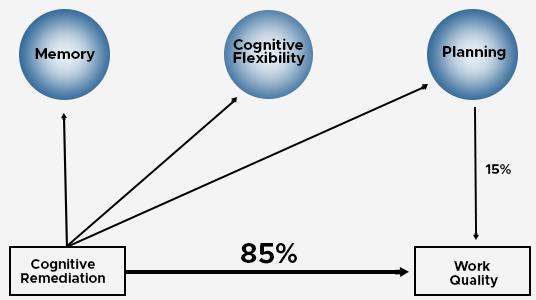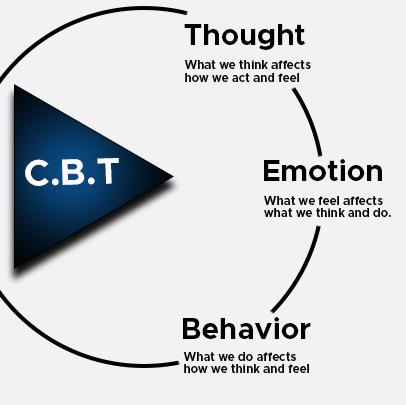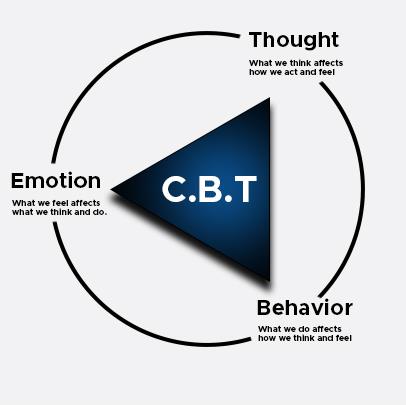Save 25% On Your First Autoship Order
Save 25% On Your First Autoship Order

There are numerous, different types of therapies available for those who suffer from a variety of issues. Many people turn to psychotherapy to deal with disorders such as anorexia nervosa, obsessive-compulsive disorder, schizophrenia, and even to deal with stressful situations. Two treatments, CRT (cognitive remediation therapy) and CBT (cognitive behavioral therapy) are two paths that your therapist may want to explore. While they may seem similar, there are differences and we here at HPFY can hopefully explain them to you.

There is a plethora of mental disorders that can create problems that affect our cognitive skills. These can be everyday skills such as concentration, memory, and even problem-solving. These therapies attempt to correct or strengthen these cognitive skills through repeated strategies and exercises. These can be done with a computer or even with paper and pencil. Often these are problem-solving scenarios that involve a variety of strategies. Those who can benefit include:
These therapies can help people think and learn better which in turn can help them improve and have a better understanding of their own recovery. The primary goal of any cognitive therapy or training is to improve any impaired cognitive skills that can lead to an improvement in social interactions, daily functioning, and improving their quality of life.
One therapy that can be used to combat mental disorders is Cognitive Remediation Therapy or CRT and it is designed to improve neurocognitive abilities. This can include attention, memory, and executive functioning. It aims to change behavior through attention paid to emotions and thoughts. Two disorders that can benefit greatly from this therapy are schizophrenia and psychosis, but other disorders, such as anorexia nervosa, can also benefit. For instance, those suffering from schizophrenia show cognitive deficits in executive functioning, attention, and verbal communication, while those dealing with anorexia have difficulties in set-shifting tasks. Cognitive remediation therapy uses techniques that are designed to teach thinking skills that can improve cognitive abilities and social skills. Some of these therapies or techniques include:

These therapies or techniques can be used in a variety of settings. They can be in an individual or group setting and even incorporate computerized training or old-school pencil and paper techniques.
Another common therapy is Cognitive Behavioral Therapy or CBT which is a psychosocial intervention method that attempts to change negative psychological issues through the use of personal coping strategies that target specific cognitive issues. CBT is used to understand the feelings or thoughts of the patient in order to fully understand their behavior. Prior psychotherapy techniques had searched for the unconscious causes of behavior. CBT is a good tool for anxieties, phobias, depression, and even addiction. Also, cognitive behavioral therapy can be used for teen eating disorders such as anorexia nervosa. This disorder can be devastating both emotionally and physically.
Approximately 30 million people in the US suffer from an eating disorder and half of these also meet the criteria for depression. Many eating disorders are influenced by social factors and peer pressure, therefore prime candidates for cognitive behavioral therapies. CBT isn’t one specific therapy, but a term used for an “umbrella” therapy term that encompasses many types of cognitive therapy. CBT is usually approached using six phases:

It is after these steps that the therapist will determine if the therapy was successful or not. They do this by determining a baseline before therapy begins and then determining if the negative behavior has diminished (successful therapy) or has remained the same or worse (unsuccessful therapy).
Yes, CRT and CBT are both cognitive therapies that can help those affected by disorders such as schizophrenia and eating disorders, but there are subtle differences in the methods that are applied during therapy sessions. These psychological disorders need to be addressed by a professional who has experience in developing therapy methods that can overcome these cognitive and social disorders.
1. What is cognitive rehabilitation for dementia?
Cognitive rehabilitation is a behavior change intervention based on understanding the cognitive changes seen in mild to moderate dementia, which builds on relatively better preserved cognitive abilities to address and overcome the impact of cognitive impairment.
2. How does cognitive remediation therapy work?
Cognitive remediation therapy involves using repeated strategies and exercises to strengthen different cognitive skills. This form of brain training is used with counseling to improve cognitive processes. Moreover, if these impaired skills are ignored, a person will have trouble getting through a normal day.
3. What is CRT for anorexia?
Cognitive remediation therapy (CRT) aids people in developing cognitive strategies and enhancing their thinking skills by practicing mental exercises. Interestingly, it was originally developed for people with brain injuries but adapted to enable individuals with schizophrenia and, more recently, anorexia nervosa.
Disclaimer: All content found on our website, including images, videos, infographics, and text were created solely for informational purposes. Our content should never be used for the purpose of diagnosis or treatment of any medical conditions. Content shared on our websites is not meant to be used as a substitute for advice from a certified medical professional. Reliance on the information provided on our website as a basis for patient treatment is solely at your own risk. We urge all our customers to always consult a physician or a certified medical professional before trying or using a new medical product.

Kevin Cleary has been a Health Products For You contributor for many years and has a degree in marketing. His health and wellness journey has a very personal meaning and has guided him in his content writing for HPFY.
In 2006, ...
How To Increase Iron Levels Quickly
It’s a question that must have puzzled you like many others. Iron is essential in hemoglobin production and its inadequate levels can negatively impact your health. Dive into this informative article to explore top iron-rich foods that can help you fight iron deficiency.
10 Best Coccyx Cushions for Tailbone Pain
If you're like most people, you spend about 8 to 10 hours sitting every day. However unhealthy, it is part of life for many, and can cause tailbone pain. Coccyx cushions can help alleviate this pain. Click to read more and find the perfect coccyx cushion for your tailbone pain.
5+ Best Adult Diapers for Fecal Incontinence
Dealing with fecal incontinence can be challenging, but you're not alone. Read this article and navigate through discreet and effective solutions that help you manage fecal incontinence and let you live life on your terms with confidence and comfort.
Top 5 Best Reviewed Nebulizers of 2024
Need an effective and affordable nebulizer? Look no further, in this article we offer 5 of our best reviewed nebulizers that are loved by our customers. Click to read more and find the perfect nebulizer for all your respiratory needs.
10 Best Penis Pumps For Erectile Dysfunction
For anyone dealing with erectile dysfunction, penis pumps serve as a great way to manage it. But with so many products available, determining the best one for your needs can be challenging. To assist you in refining your choices and making an informed decision, here are our top 10 options, recognized for their effectiveness and safety.